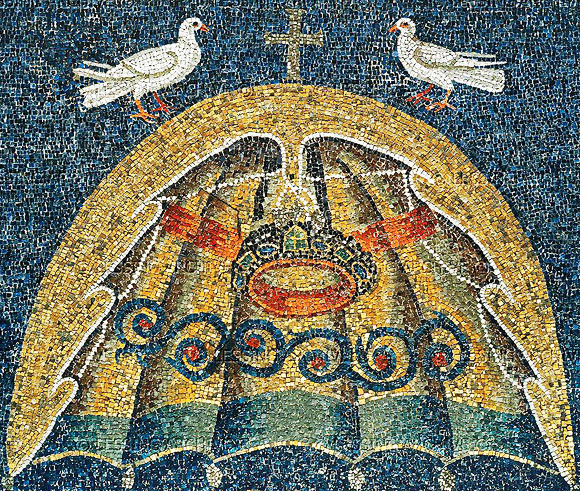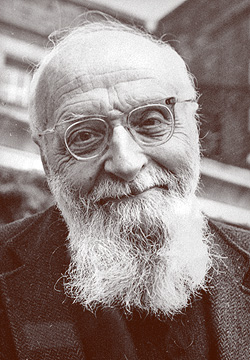The beginning of the Church Year
1 September 2014
The Byzantine liturgical year begins on 1 September. A brief inspection of the texts read at the services for this day indicates the internal attitude which the Church wishes to inculcate in us at the beginning of the year.
At Vespers for 1 September, which, in Byzantine style is celebrated on the evening of 31 August [because that is when the day begins according to this reckoning, not 12 o’clock midnight], there are three readings from the Old Testament. The first is from the Prophet Isaiah (61, 1-9: ‘The Spirit of the Lord is upon me because he as anointed me… they are a seed blessed of God’). This is the passage read by the Lord- and applied to Himself- in the synagogue in Nazareth, as we hear in the liturgy on the morning of 1 September. There are some words of Isaiah’s which don’t come into the passage quoted by the Lord, but which are nevertheless worthy of particular attention: ‘And they shall build on ancient wastelands, they shall resurrect what was formerly made desolate and restore cities abandoned for generations’ (61, 4). There’s a message of hope here for those who consciously bring to the threshold of the new year a soul full of desolation and barrenness: our spiritual desert can be salvaged in the year which is beginning. The prophet also informs us what God will do for those who are afflicted: He will give them ‘glory instead of ashes, the unguent of joy to those who mourn, the garment of glory instead of the spirit of sloth’.
The second reading for Vespers is from Leviticus (26, 3-12, 14-17,1920). This is a serious warning God gives to His people: that their fate will depend on whether they honour the covenant between God and Israel or violate it. From this stems the antithesis: ‘If you walk in my statutes and keep my commandments and do them… But if you do not listen to me nor keep these statues of mine, but disobey them…’. In either case, the divine response will affect the welfare of the people and will be expressed in terms of abundance of agricultural products or scarcity: ‘I will give you rain at the appointed time and the land will give its produce and the trees of the plain will yield their fruit… And your strength will be in vain and the earth will not give its seed, nor will the tree of the field yield its fruit’. God is the creator and master of the physical universe, as He is of souls. Our material lives depend on His goodness and He does not leave the righteous without bread or a roof. Besides, two other verses from the same text promise us more than our daily bread: ‘And I shall erect my tabernacle among you…and I shall walk among you and be God to you…’.
The third reading is from the Wisdom of Solomon (4, 7-15). Here the unknown author rails against the Jewish concept which, by and large, equated moral perfection and longevity: ‘For honourable old age is not length of time, nor is it measured by the number of years’. To be old, in the best sense, is to have known how to please God. ‘He was pleasing to God and beloved [by him], because ‘old age is a life without blemish’. At the threshold of the New Year, then, we’re invited to meditate on a concept which is no longer material, but rather purely spiritual, that of time and age.
At Matins for 1 September, we hear one of the Gospel extracts concerning the Resurrection which are read at Sunday Matins. The appointed text is Luke (24, 1-12). It may be that the reason for this text lies with the words relating to the holy women: ‘On the first day of the week, very early in the morning, they came to the sepulchre’. We, too, are invited to direct our thoughts to the risen Lord, at day-break, at the first light of the New Year, on the first day of the week (the week in this case being the year).
The epistle read at the Liturgy on 1 September (1 Tim. 2, 1-7) reminds us of the duty we have to pray for others: ‘I exhort you, therefore, that, first of all, supplications, prayers, intercessions and thanksgiving be made for all people’. It’s particularly apt that, on this first day of the year, we should bring to our Lord’s heart all those to whom we’re bound with ties of justice and of charity. Let’s examine the word ‘thanksgiving’. Saint Paul wrote it here, at the end, with a definite purpose in mind. It may be that we do, indeed, pray often for the needs of others, but most believers seldom think to thank God for the individual benefits He bestows on their fellow human beings.
The main Scriptural text for this day is the Gospel read at the Liturgy (Luke 4, 16-22). On his return to Nazareth, Jesus entered the synagogue. He was asked to read the portion of Scripture appointed for that Sabbath. He opened the scroll of the Prophet Isaiah and read: ‘The spirit of the Lord is upon me because he has anointed me to preach the glad tidings to the poor, he has sent me to heal the broken in heart, to declare deliverance to the prisoners and recovery of sight to the blind, to proclaim the acceptable year of the Lord’. Jesus rolled up the scroll, sat down and said, ‘Today this scripture is fulfilled in your ears’. Jesus directs this same solemn declaration to us every year. I’m poor, perhaps not in material terms, but certainly spiritually; I’m a prisoner, a captive of my own selfishness and sin; I’m blind, since my eyes are incapable of seeing the divine light; and I’m heart-broken, perhaps by the external circumstances of my life, but much more by my repeated spiritual failures. And all the time, Jesus is there before me, offering me deliverance. He is Himself the incarnation of all deliverance and all forgiveness. If, at this moment, I accept His word, His salvation, everything can be made new for me. This offer is made to me today, on the first day of the New Year. I’ve already heard this divine promise so many times, at the beginning of so many years, and have abused this grace so many times, wasting the opportunities opened for my conversion because I’ve persisted in sin. Yet despite this accretion of infidelities, Jesus still renews His offer to me: for me, this year which is beginning can still be ‘a year of grace of the Lord’. I don’t know if I’ll have the strength and grace to persevere, but at least, on this first day I can look towards the Lord in a spirit of faith and consecration.
 The Gospel says: ‘And the eyes of all of those who were in the synagogue were fixed on him’. If only, on this first day of the year, my eyes might turn away from the defilements in which they take pleasure and fix on Christ- and remained fastened on Him. Because if I have the courage to keep my eyes only on Christ, if I don’t turn them aside, I won’t fall again. Lord Jesus, I look at you. I’ve heard Your promises. Let me now hear, in a way that’s entirely personal and intimate, the assurance, ‘Today this scripture is fulfilled in your ears’.
The Gospel says: ‘And the eyes of all of those who were in the synagogue were fixed on him’. If only, on this first day of the year, my eyes might turn away from the defilements in which they take pleasure and fix on Christ- and remained fastened on Him. Because if I have the courage to keep my eyes only on Christ, if I don’t turn them aside, I won’t fall again. Lord Jesus, I look at you. I’ve heard Your promises. Let me now hear, in a way that’s entirely personal and intimate, the assurance, ‘Today this scripture is fulfilled in your ears’.
Source: Fr. Lev Gillet, L’An de Grâce du Seigneur






